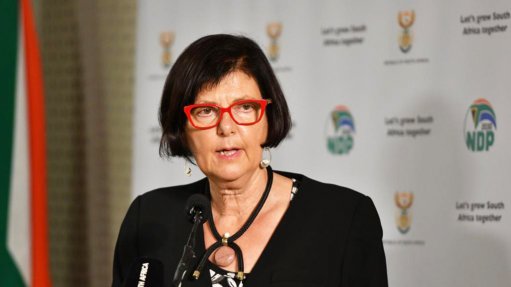
South Africa’s Environment Minister Barbara Creecy
South Africa’s Environment Minister Barbara Creecy has again called for new financial instruments, particularly non-debt instruments, to be pioneered in Africa to assist the continent in overcoming the gaping finance gap that is hindering the building of climate-resilient infrastructure.
Speaking during a panel discussion on Scaling International Climate Finance for Africa that took place in parallel to the Africa Climate Summit in Nairobi, Kenya, Creecy argued that the form of the finance available should not lead to the increased debt burden of African and other developing countries.
“We need access to scaled-up new and additional and predictable grant and highly concessional finance which could be deployed effectively to create enabling environments by beginning to buy down risks and create new asset classes for clean investments.”
Creecy used the platform to again criticise developed countries for failing to meet their $100-billion-a-year mobilisation goal, while still promising a doubling by 2025.
“Despite the clear provisions in the Paris Agreement that make the level of ambition by developed countries contingent on the support provided by developed countries, we continue to witness a decline in the delivery of public climate finance in real terms.”
African countries, she argued, needed a new suite of financing instruments, with a set of favourable terms and conditions that were not merely debt generators.
Should such an approach not emerge “efforts and actions to mobilise the trillions of dollars required for significantly scaled-up climate action will be actions in futility”.
The new instruments, Creecy argued, should focus on the economic costs of transition risk by taking first loss risks on investments in technologies that were not yet commercially available.
“In addition, we need approaches that facilitate scaling-up through interventions that help bridge the gap to commercial project viability, mitigate risks, finance first-of-its-kind projects and support technical assistance work.”
Local currency lending was also held up as an imperative to support climate action in Africa.
“With an estimated annual infrastructure financing requirement in the range from $130- to $170-billion, according to the African Development Bank, implementing urgent measures to improve the resilience of Africa’s infrastructure investments must become the main occupation for us as decision-makers.
“Planning new infrastructure for climate resilience and adapting existing infrastructure to reduce risks should be a priority as there is a high probability that climate change will offset or reduce the economic and developmental benefits of these investments,” she warned.